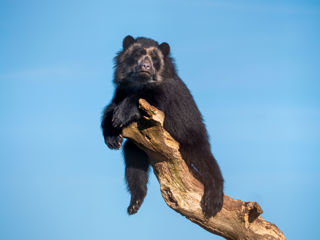
Tawny Owl
Scientific name: Strix aluco
Tawny Owls are the most common native owl in the UK and are highly territorial of their home range, which is usually 30-50 acres. These nocturnal birds are often seen before they are heard.
Its flight includes long glides on rounded wings, with fewer wingbeats, and at a greater height than other Eurasian owls. It will hunt by suddenly dropping from a perch onto its prey, which they usually swallow whole.
Their typical lifespan is 5 years in the wild, with breeding taking place in their second year. Tawny Owls tend to mate for life and lay only one clutch of 2-3 eggs per year, in late winter or early spring. Young tawny owls will often sit near the nest on branches before officially leaving the nest during a ‘branching phase’, and will still be dependent on their parents for food for up to 3 months after leaving the nest. They will nest in a variety of places including old crow and pigeon nests, or squirrel drays, but they prefer cavities in dead trees and hollow tree trunks. Unlike barn owls, it is rare to find them roosting or nesting in buildings.

-
At Noah's Ark...
Our Tawny Owl is called Orion.
-
We live...
In the Birds Of Prey enclosure, next to the ring tailed lemur enclosure.
-
Food Fact
They mainly eat small mammals, specifically wood mice, bank voles and field voles. However, they have also been recorded eating rabbits, moles, small birds, invertebrates, frogs and fish.
-
Fun Fact
They are the only owl in the world to make the ‘twit twoo’ sound! The female ‘twits’ and the male responds with the ‘twoo’ sound. They have been recorded eating carrion (dead animals) in times of hardship.
-
Size Fact
The Tawny Owl is a medium sized bird, with a wing span of 81-105cm (32 - 41in)
You might also like...
-
![Meerkats]()
Meerkat Keeper Talk
Come along and learn about our mob of Meerkats from our experienced animal keepers.
Find out more
-
![Zoe And Falcon]()
Bird of Prey Flying Display
Watch our majestic birds of prey in our new Wings of Wonder flying display.
Find out more
-
![Andean Bear]()
Bear Keeper Talk
Learn about our Spectacled bears from our experts and find out what it is like to be a Spectacled bear keeper.
Find out more
-
![African Elephant - Shaka 2]()
Elephant Keeper Talk
Did you know Elephants are the largest land animals on Earth? Come and join our Elephant Keepers and learn about our bulls.
Find out more





